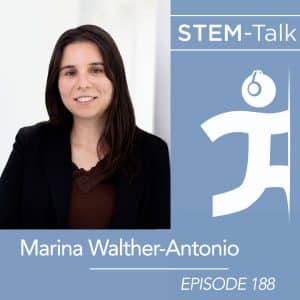STEM-Talk: Marina Walther-Antonio on the microbiome and gynecologic cancers
Marina Wather-Antonio was raised to ask questions — and encouraged to find the answers for herself.
Born in the years after Portgual’s dictatorship fell in 1975, she says her father prized intellectual rigor and raised her to be an independent thinker.
“My dad was very set on raising me in a way that I wouldn’t just be believing everything everyone told me,” she says. “Inadvertently, I think he ended up raising a scientist because I would ask questions as any little kid does and he would never answer them.”
That led her to a career in science asking questions that could have a fundamental impact on women’s health and well-being.
Walther-Antonio is an assistant professor at the Mayo Clinic in Rochester, Minn., whose research focuses on the human microbiome and women’s health. On this episode of STEM-Talk, she shares how she and her colleagues are using the methodologies of environmental microbiology and astrobiology — two disciplines she studied early in her career — to improve our understanding of gynecologic cancers.
She and her team have been developing early detection tests that will help clinicians intervene earlier in the treatment of ovarian and endometrial cancers.
The microbiome field emerged from an idea that there are microbes that exist in our body that may not be pathogens. “They may be beneficial,” she says. “I see it as a field that is between environmental microbiology and clinical microbiology in that we look at the human body as an ecosystem and how do we get that ecosystem into healthy balance and build resilience in people.”
Her professional career wound down a couple of paths before she found a home investigating the microbiome’s role in cancer and reproductive health.
The conversation in Episode 188 covers topics such as:
- Her internship at NASA, which included several projects under way at the Astrobiology Institute that took her to a Mars analogue site in Oregon’s Warner Valley.
- How her mentor when she joined the Mayo Clinic, Heidi Nelson, encouraged her to pursue her interests beyond the surgical department where she first came to work. “She told me, just because you are in the department of surgery, don’t feel constrained… Mayo is a big place, go find your collaborators, your people, and talk to folks about the problems they have and want to solve and see what you are interested in.”
- How that advice led her to women’s health and gynecologic cancers and the role the microbiome could have in these diseases.
- An ongoing study with Mayo and Wellsley College looking to better understand what the vaginal microbiome looks like (including its normal daily fluctuations) to help build a baseline to underpin future research.
- The challenges and importance of longitudinal research, especially to help understand the environmental components of these studies.
- What mentorship means to her especially as director of the Mayo Clinic’s membership and Ph.D. program. “There’s great coaching provided to faculty to support their teaching. I saw some of those programs and thought there are folks who never get considered for positions later in their career because they just never had good mentorship in how to be a leader in that way,” she says. She wanted to provide some of that guidance early to people, when they were still working on their Ph.D.’s, to help fill that gap early on in their careers.
- Why time with family and friends and doing things that you love can be a critical piece of recharging and connecting to the creativity that strengthens your scientific pursuits.
- How her early enthusiasm for studying extraterrestrial life continues to inform her curiosity.
STEM-Talk is an award-winning podcast from the Florida Institute for Human and Machine Cognition that hosts conversations with the leading minds in science and technology. Listen on your favorite platform or browse our library at https://www.ihmc.us/stemtalks/
Latest News
- STEM-Talk: Francisco Gonzalez-Lima on methylene blue and noninvasive brain stimulation
- STEM-Talk: Judith Curry and the Consequences of Climate Alarmism
- STEM-Talk: NASA’s Flawed Plan to Return to the Moon – with Mike Griffin and Lisa Porter
- IHMC partners with Conduit Venture Labs to accelerate commercialization efforts
- Research platforms aim to better support military personnel in high-stress environments
- Study for U.S. Air Force Research Lab tracks impact of ketones on pilot ventilation
- National Institute on Aging funded study tracks changes to gait as we age
- Meet Alex, IHMC’s next generation humanoid robot
- Decades of AI-expertise fuel growth of National Center for Collaborative Autonomy

